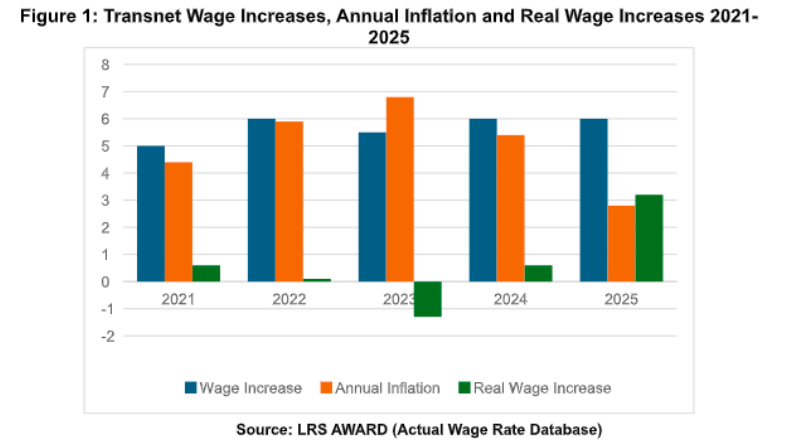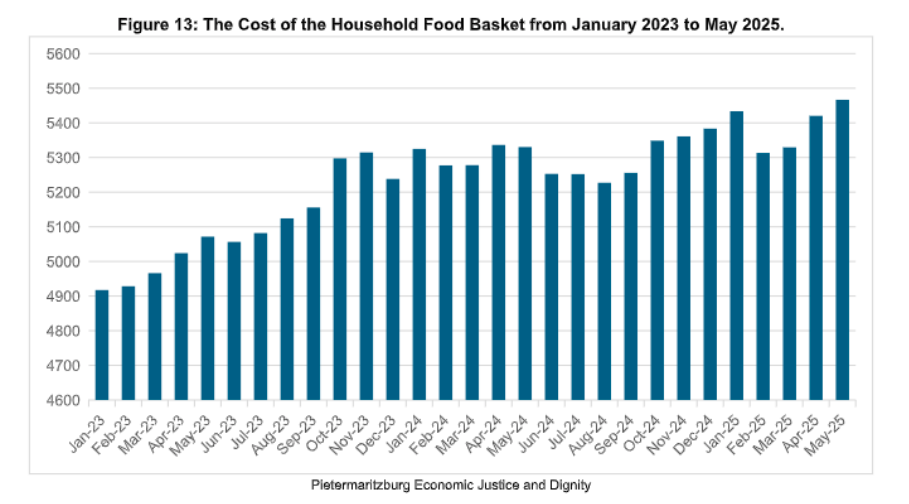Transnet recently concluded a three-year wage agreement with its recognised unions, the South African Transport and Allied Workers Union and the United National Transport Union. The collective agreement secures a 6% annual wage increase for workers until 2025 and includes important improvements to benefits, including pensions, medical aid, housing allowances, and the 13th cheque. Despite criticism from some quarters about the affordability of this deal, it’s vital to understand what this increase means for workers and why it’s justified.
Trade unions don’t pull figures out of thin air. Wage demands come from workers themselves, based on their everyday realities, cost of living, and a desire for dignity at work. A 6% increase may sound high to those sitting in boardrooms, but for the lowest-paid Transnet workers earning R12,577 a month, it adds just R711.90. Meanwhile, in 2024, Transnet’s CEO earned R5.5 million, roughly R398,250 a month. It is hypocritical that a 6% raise for workers sparks outrage, while the growing gap between executive and worker pay goes ignored.
Collective bargaining is a democratic process
We must remember that collective bargaining is a two-way negotiation between workers and employers. It is not about threats or capitulation. It is about reaching an agreement that both sides can live with. Transnet and the unions reached their agreement through negotiation with the help of the Commission for Conciliation, Mediation and Arbitration (CCMA). It was not imposed; it was a result of negotiation and conciliation.
Wage bargaining is one of the most critical responsibilities of a trade union. Workers themselves develop the demands and union negotiators act on their mandate. Blaming unions for advocating on behalf of their members is misplaced. To blame unions is to blame the workers.
Figure 1 describes median settlement levels at Transnet between 2021 and 2025. The figure also tracks annual inflation over the period and shows what the real wage increase has been like each year.
Figure 1: Transnet Wage Increases, Annual Inflation and Real Wage Increases | 2021-2025

From 2021 to 2025, Transnet’s wage increases mostly kept pace with inflation. The wage increase was 5% in 2021. If we consider the annual inflation rate of 4,4%, workers gained a real wage of 0,6%. In 2024 and 2025, wage increases surpassed the annual inflation rate and recorded real wage increases of 0,6% and 3,8% respectively. This recovery is necessary after years of real wage loss, particularly in 2023 when inflation exceeded wage increases.
What a 6% wage increase means for the lowest-earning worker
If we consider the monthly salary of R12,577 for general workers, this increase amounts to just R711.90. This figure is quite low, especially since it represents a nominal wage increase rather than a real wage increases after accounting for inflation.
Let’s consider the rising cost of food. The household food index is specifically designed to measure food price inflation as experienced by households living on low incomes in Pietermaritzburg, but may be used to give insight on food price inflation as experienced by households living on low incomes in South Africa.
Figure 2: Month-On-Month Household Food Basket | January 2023 to May 2025

Between January 2023 and May 2025, the cost of a basic household food basket rose from R4,917 to R5,461, an increase of R550 or 11.1%. This puts enormous pressure on working-class households. Even with the 6% increase, workers are simply keeping pace with rising living costs.
Dignity at work
Workers do not negotiate to sink companies. Trade unions exist to represent the voice of workers in the workplace and society. Their role is not to protect profits but to fight for fair treatment, decent work, and dignity.
When we question why workers ask for more, we should also ask: more of what? A R711 increase for a general worker is the difference between going to bed hungry or not. Meanwhile, no one is questioning multimillion-dollar executive salaries.
The wage agreement at Transnet shows successful dialogue rather than a leadership failure. Dignity and justice in transportation begins with valuing the contributions of the workers.
RELATED RESOURCES







